SOUND, SPEECH, MUSIC IN SOVIET AND
POST-SOVIET CINEMA
SOUND, SPEECH, MUSIC
IN SOVIET AND
POST-SOVIET CINEMA
Edited by Lilya Kaganovsky and
Masha Salazkina

This book is a publication of
Indiana University Press
Office of Scholarly Publishing
Herman B Wells Library 350
1320 E. 10th Street
Bloomington, Indiana 47405-3907 USA
iupress.indiana.edu
Telephone 800-842-6796
Fax 812-855-7931
2014 by Indiana University Press
All rights reserved
No part of this book may be reproduced or utilized in any form or by any means, electronic or mechanical, including photocopying and recording, or by any information storage and retrieval system, without permission in writing from the publisher. The Association of American University Presses Resolution on Permissions constitutes the only exception to this prohibition.
 The paper used in this publication meets the minimum requirements of the American National Standard for Information SciencesPermanence of Paper for Printed Library Materials, ANSI Z39.48-1992.
The paper used in this publication meets the minimum requirements of the American National Standard for Information SciencesPermanence of Paper for Printed Library Materials, ANSI Z39.48-1992.
Manufactured in the United States of America
Library of Congress Cataloging-in-Publication Data
Sound, speech, music in Soviet and post-Soviet cinema / edited by
Lilya Kaganovsky and Masha Salazkina.
pages cm
Includes bibliographical references and index.
ISBN 978-0-253-01104-6 (paperback) ISBN 978-0-253-01095-7 (cloth) ISBN 978-0-253-01110-7 (ebook) 1. Motion picturesSoviet Union. 2. Film soundtracksSoviet Union. 3. Motion picture musicSoviet UnionHistory and criticism.
I. Kaganovsky, Lilya, editor. II. Salazkina, Masha, editor.
PN1993.5.R8S67 2013
781.5420947084dc23
2013042567
1 2 3 4 5 19 18 17 16 15 14
Contents
Masha Salazkina
Nikolai Izvolov
Joan Titus
Valrie Pozner
Natalie Ryabchikova
Emma Widdis
Evgeny Margolit
Jeremy Hicks
Oksana Bulgakowa
Elena Razlogova
Kevin Bartig
Anna Nisnevich
Joan Neuberger
Peter Schmelz
Lilya Kaganovsky
Acknowledgments
THIS VOLUME CAME about as a result of our mutual frustration with the lack of English-language materials on sound in Soviet and post-Soviet cinema. In it, we have tried to bring together new work by scholars from several disciplines, providing a larger historical framework for the discussion of the sonic turn in Soviet film studies, as well as close readings of individual films that pay particular attention to the way sound, speech, and music operate in Soviet and post-Soviet cinema. We are grateful to Indiana University Press and in particular to our editor Raina Polivka, for her enthusiasm, advice, and support of this project. We also owe many thanks to the commitment and patience of our contributors to this project as the volume has gone through its various incarnations, as well as to the support and interest of several fellow-travelers and interlocutors, in particular Polina Barskova, Birgit Beumers, Vincent Bohlinger, Andrew Chapman, Katerina Clark, Nancy Condee, Julian Graffy, Naum Kleiman, Vera Kropf, Susan Larsen, John MacKay, Joshua Malitsky, Simon Morrison, Sergei Oushakine, Amy Sargeant, and Mark Slobin, as well as to our two external reviewers, whose attentive appraisals helped shape this book.
Likewise, we owe many thanks to our translators Andre Lafontaine, Sergei Levchin, and Katrina Sark, and our team of editorial assistants for their work on this collection. We are particularly grateful to Dru Jeffries, whose meticulous readings helped bring this volume to completion.
Sound, Speech, Music in Soviet and Post-Soviet Cinema received generous support at both of our home institutions, as well as from national organizations, and of course, from family and friends.
Lilya Kaganovsky would like to thank the University of Illinoiss Research Board; the federally funded Russian, East European, and Eurasian Center; the Department of Slavic Languages and Literatures; and the Program in Comparative and World Literature for providing research assistance, conference travel, and research travel support; and the American Council of Learned Societies, together with the National Endowment for the Arts and Social Science Research Council, for fellowship support that provided leave time for this project. She is particularly grateful to her friends and colleagues at Illinois, Cambridge, and beyond; and most importantly to R.R., S.R., H.., A.., and O..
Masha Salazkina would like to thank Concordia Universitys Aid to Research Related Events, Exhibition, Publication, and Dissemination Activities and the Faculty of Fine Arts for providing research and translation funds for this project, as well as her colleagues at the Mel Hoppenheim School of Cinema for their advice and support. Without Igor Salazkins tireless search for books and Luca Caminatis unfaltering patience and unconditional support, none of this would have been possible.

Two of the chapters in the present volume were originally published in Russian in the excellent collection Sovetskaia vlast i media (Soviet Power and the Media, 2006), edited by Hans Gnther and Sabine Hnsgen. We are grateful to the editors, Gnther and Hnsgen, and to the authors, Nikolai Izvolov and Evgeny Margolit, for their permission to translate their work here. While the volume itself is out of print, an electronic version of the text is available at http://pub.uni-bielefeld.de/publication/23050177 .
Note on Transliteration
THE TRANSLITERATION SYSTEM we use in this volume aims for readability in the text and accuracy in the notes. Russian names in the text are given in their conventional English-language spelling to render them more accessible, while Library of Congress system of transliteration is followed in all other instances. In translating titles of Russian films, we have also inserted articles where English fluency requires them.
Abbreviations
Gosudarstvennyi arkhiv Rossiiskoi Federatsii (GARF)State Archive of the Russian Federation
Gosudarstvennyi fond kinofilmov Rossiiskoi FederatsiiGosfilmofond
Rossiiskii gosudarstvennyi arkhiv ekonomiki (RGAE)Russian State Archive for Economics
Rossiiskii gosudarstvennyi arkhiv kinofotodokumentov (RGAKFD)Russian State Archive of Film and Photo Documents
Rossiiskii gosudarstvennyi arkhiv literatury i iskusstva (RGALI)Russian State Archive for Literature and the Arts
Rossiiskii gosudarstvennyi arkhiv sotsialno-politicheskoi istorii (RGASPI)Russian State Archive of Socio-Political History
Tsentralnyi gosudarstvennyi arkhiv literatury i iskusstva, Sankt-Peterburg (TSGALI SPb)Central State Archive for Literature and Art, St. Petersburg
SOUND, SPEECH, MUSIC IN SOVIET AND POST-SOVIET CINEMA
Introduction
Masha Salazkina
KIRA MURATOVA, ONE of the most celebrated and original contemporary Russian film auteurs, was asked in a 1995 interview what she had learned from her film-school mentor Sergei Gerasimov, whose filmmaking was so distinct from hers. She answered that he taught her to listen and to hear, awakening [in her] an interest in and an elation from listening. In the same interview Muratova identified endless manipulations of accents, modes of delivery, and systems of repetition as distinguishing markers of her personal authorial style. There is little doubt that Muratova is the contemporary Russian director with the most developed sense of hearing; that she is a product of an institutional apparatus with its own complex relationship to the aural dimensions of cinemawhich her comment about Gerasimov seems to implymight well serve as a vector for reconsidering the aural in the larger tradition of the Soviet cinema.
Next page

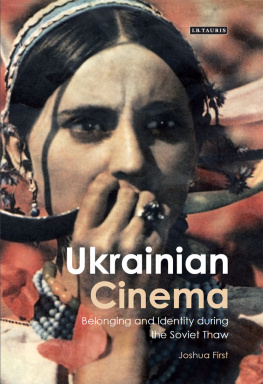
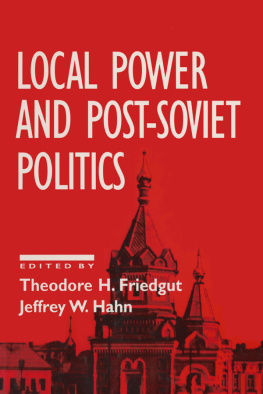
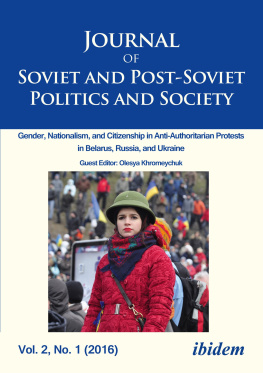
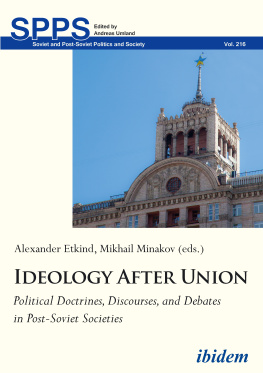
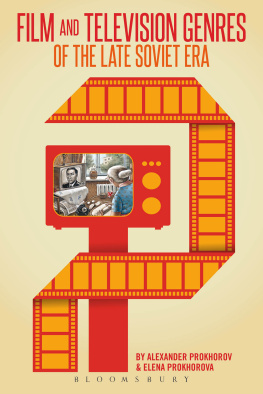

 The paper used in this publication meets the minimum requirements of the American National Standard for Information SciencesPermanence of Paper for Printed Library Materials, ANSI Z39.48-1992.
The paper used in this publication meets the minimum requirements of the American National Standard for Information SciencesPermanence of Paper for Printed Library Materials, ANSI Z39.48-1992.